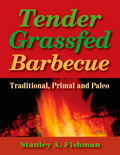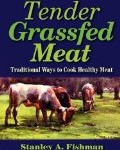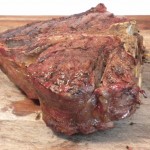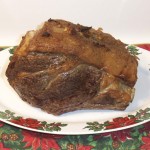Enjoy Grassfed Barbecue Without Fear
By Stanley A. Fishman, author of Tender Grassfed Meat and Tender Grassfed Barbecue
Every barbecue season, the health “experts” tell us what not to eat to supposedly “lower the risk of cancer.” Usually the first item on their list can be predicted before the list comes out, “Do not eat red meat!”
I have a huge problem with this advice. These experts NEVER distinguish between factory red meat and grassfed red meat. Factory red meat is raised with the use of chemicals, fed unnatural feed sprayed with pesticides, and often bizarre feeds like chicken manure, donuts, and candy bars still in their wrappers. Grassfed meat is raised on green living grass, without the chemicals, and unnatural feed. The difference between these two types of meat is huge, as they are very different in their content and composition. The studies used by these experts for the basis of their opinion NEVER distinguish between factory meat and grassfed meat, treating them like the same substance. Since over ninety-eight percent of the red meat eaten in the U.S. is factory meat, those studies really only apply to factory meat, not grassfed.
Our ancestors barbecued red meat all the time. In fact, a huge portion of the meat enjoyed by humanity for thousands and thousands of years was cooked with fire. But until modern times, nearly all of this meat was grassfed.
Is Grassfed Meat Dangerous to Barbecue?
Every food has some element of risk, but I do not worry about barbecuing grassfed meat. As long as I use the traditional techniques described in my book, Tender Grassfed Barbecue, and as long as all the red meat I barbecue is grassfed or pastured—I feel fine.
The studies that demonize red meat and claim it increases cancer risk all have a huge flaw. Since all these studies are based on factory meat, they are not just testing meat. They are also testing the effect of the chemicals, growth hormones, and unnatural feed in the meat. Is the increased cancer risk found by these studies created by the meat, or by the chemical additives to the meat, or by the unnatural feed, or by the combination of some or all of these factors? No study has resolved this issue, and no study has addressed it. To the studies, red meat is all the same. A few recent studies have tried to differentiate between fresh red meat and processed meat. But even these studies do not distinguish between factory meat and grassfed meat.
The studies that have found that barbecuing red meat increases cancer risk also treat all meat the same. In addition, it appears that the meat was cooked by direct high heat, directly over the heat source, in all these studies. Most Americans use direct high heat when they barbecue.
So, in looking at these studies, we must ask—What causes the increased risk of cancer? Is it the meat? Or the chemical additives to the meat? Or the unnatural feed? Or the barbecuing methods? Or any combination of these?
There are no modern studies that address these questions directly. But there is an older study, one that I consider to be the most well researched, well reasoned, and valid nutritional study ever made—the research of Dr. Weston A. Price.
Dr. Price, a dentist and researcher, noticed that in each generation, his patients were sicker than their parents, and had worse teeth. Dr. Price suspected that the reason was nutritional, and spent many years traveling the world to study those peoples who were healthy and had great teeth. Dr. Price found that the peoples he studied, eating the diet of their ancestors, were free of the chronic diseases that plague modern cultures, and had perfect teeth. One of the diseases they did not have was cancer. And nearly all of these peoples barbecued grassfed meat. Some of them ate huge amounts of grassfed meat, often barbecued. So, based on Dr. Price’s research, eating barbecued grassfed and wild meat does not cause cancer.
In researching traditional barbecue methods, I learned that almost nobody barbecued meat directly over a very hot heat source, which is the most common barbecue method in the U.S., today. Our ancestors either cooked their food in front of, but never over a fire, or they placed their meat so high above a low fire that the meat would never get scorched or be touched by flames. This is completely consistent with modern studies that have found that substances believed to be carcinogenic are created by grilling meat directly over a hot heat source or by fat dripping directly over the heat source.
These risks can be avoided simply by barbecuing as our ancestors did, and never putting meat directly above a hot heat source. Interestingly enough, some of the experts also advise avoiding high heat when barbecuing. I trust the research of Dr. Price, which showed that people can eat large amounts of red, grassfed meat while remaining free of all cancer.
Should Meat Be Pre-Cooked Before Grilling?
Some of the experts advise that you partially cook all meats before barbecuing them. The theory is that the less time the meat is the barbecue, the safer it is. That conclusion is simply not supported by the studies which found that the substances believed to be carcinogenic were created by cooking over direct high heat. If you barbecue in a traditional manner, this problem is solved.
Our ancestors did not pre-cook meat and finish it on the barbecue. And they most certainly did not “nuke” the meat in a microwave, which some of the experts advise. In fact, I never use a microwave, not for any purpose. Microwaves heat food from the inside out, something that was never done in all the history of human cooking before. Some research has found that microwaving foods changes their very composition, in ways that have never occurred before. Not something that our ancestors ate and not something that I want to eat. And, to be honest, the very thought of “cooking” food with microwave radiation gives me the creeps. I would much rather stick with the kind of heat used by our ancestors.
Parboiling foods to be barbecued ruins the taste and texture, in my opinion. Properly barbecued grassfed meat is tender, with the savory wood smoke flavor that only real barbecue can give. The wood flavoring of barbecued meat takes time, and reducing this time by pre-cooking means less flavor.
Should Only Lean Meats Be Grilled?
The “safer barbecue” advice this year not only contains the traditional prohibition of all red meat, without differentiating between factory meat and grassfed meat, but also recommends what should be grilled. The selection does not excite me. They recommend skinless, boneless chicken breasts, and vegetables, and fish. All of these foods are low fat. It is true that some studies have found that fat dripping directly on the heat source is a factor in creating substances believed to be carcinogenic. But you do not need to eat low-fat meat to avoid this problem. All you have to do is not cook your food directly over the heat source.
The fat of grassfed animals is not only very different from the fat of factory animals—it adds enormous flavor, as well as vital nutrients. In fact, animal fat ranging from butter to suet to lard is a huge part of my barbecue cooking. Our ancestors used and cherished this natural fat, and used it extensively in every kind of cooking, including barbecue.
To me, barbecue means what it almost always has to our ancestors—meat. And I do not include boneless, skinless chicken breasts in my cooking, as they have been stripped of the very parts that give them the most flavor, namely, the skin and the bones. You can grill vegetables, if you like, but I have never done it. I would much rather barbecue grassfed meat.
Should Barbecued Meat Be Marinated?
Traditional peoples marinated the meat they barbecued, and/or basted it. The experts do advise marinating, and I agree with them—to a point. They emphasize marinades made almost entirely out of acidic ingredients such as wine, vinegar, or lemon juice, where my marinades, based on traditional combinations, always include a good amount of healthy fat. Too much acidic ingredients in a marinade will toughen grassfed meat. Our ancestors always used plenty of fat in their marinades and bastes—and so do I. This kind of marinade and/or baste not only may be beneficial, but makes the meat more tender and delicious.
I stopped barbecuing for awhile, being concerned with the studies connecting barbecue with the creation of carcinogens. I really missed it, so I started researching traditional barbecue. I was delighted to discover that the risk factors caused by the grilling process could be avoided by using traditional barbecue methods. I was also happy to discover that these methods worked perfectly with grassfed meats, being ideal for them. My research led to the discovery of many traditional and delicious marinades and flavor combinations. This research was the foundation of my cookbook, Tender Grassfed Barbecue, which is full of delicious recipes, based on tradition, and cooked with an easy method that avoids direct high heat.
This post is part of Monday Mania, Fat Tuesday, Real Food Wednesday, Fight Back Friday, and Freaky Friday blog carnivals.
RSS feed for comments on this post.
Sorry, the comment form is closed at this time.
Read more
« Grassfed Meat Should Be Savored, Not Gulped
Traditional Heat Is Best for Cooking Grassfed Meat »


 Photos of recipes from the new book Tender Grassfed Barbecue
Photos of recipes from the new book Tender Grassfed Barbecue
 Photos of recipes from the cookbook Tender Grassfed Meat
Photos of recipes from the cookbook Tender Grassfed Meat

Fallacies Concerning Red Meat Consumption « Criterion Living posted on May 22, 2012:
[…] To Read Full Article_ CLICK HERE […]